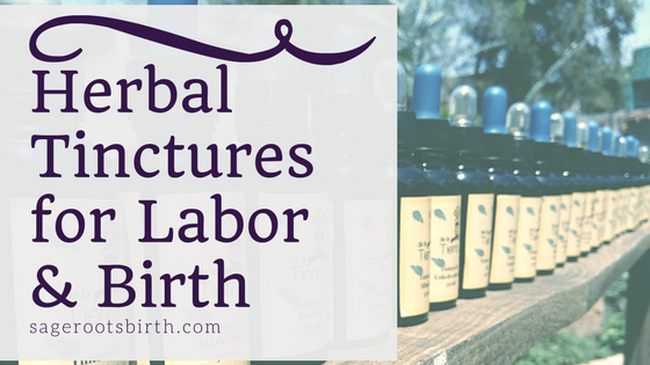|
Herbs can be an excellent alternative to pharmaceutical drugs for pain relief and comfort during labor. Herbal teas for pregnancy and breastfeeding have become popular. And certainly, teas are an excellent way to ingest herbs. However, there are multiple ways to take herbs and a tea might not be the most convenient way during labor. Tinctures, which can be prepared in advance, might be. What is a tincture? A tincture is an herbal concentrate made by steeping a fresh or dried herb for several weeks in either alcohol, vegetable glycerin or apple cider vinegar. As tinctures are prepared ahead of time, it makes them a convenient form of herbs for labor and birth. You can simply add the small bottle to your hospital bag or home birth kit. To make a tincture simply take a fresh or dried herb combine it with either 80- to 100- proof vodka, brandy, or rum (or your non-alcoholic alternative mentioned earlier) and allow it to sit for four to eight weeks in a dark place, shaking the mixture daily. After the allotted time, strain the liquid into a dark glass bottle with a dropper lid. The ratio of herb to liquid should be one part dried herbs to five parts alcohol or one part fresh herbs to three parts alcohol. To determine the dosage, note the dosage recommendation on the remedies recipe you’re using, consult with an herbalist, or utilize trustworthy reference books. The typical dosage is somewhere between 10 and 30 drops up to three times a day. You can also purchase tinctures from an herbalist and use the dosage recommended. What kind of herbal tinctures are helpful during labor and birth? Herbs that you may consider using in your tinctures for labor and birth are:
These are just a few of many that could be beneficial during labor and birth. On your exploration of herbs as an alternative pain management during labor, I encourage you to also go past the teas and capsules to explore tinctures and extracts as a convenient and effective form of herbs during labor. What do you think? Would you consider using herbal tinctures during labor? Or, if you have, what did you use? Let me know in the comments! *Make sure you have all the knowledge you need to use herbs correctly before you jump in by consulting with your care provider, herbalist, and reputable resource books.
1 Comment
|
LauraI'm the owner of Sage Roots. Woman, wife, mother, doula, writer, bookworm, hiker, gamer, and Christian. Categories
All
Archives
September 2022
|
Services |
Company |
|



